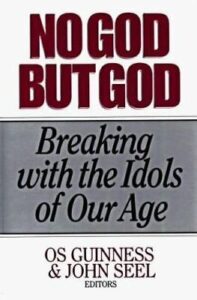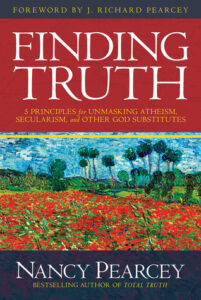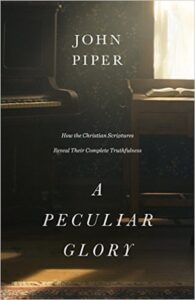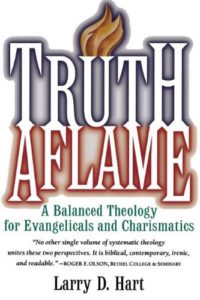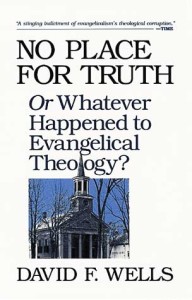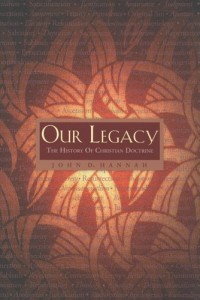NO GOD BUT GOD: BREAKING WITH THE IDOLS OF OUR AGE
OS GUINNESS & JOHN SEEL
From the Publisher: The evangelical movement is in deep disarray. Many doubt it can be defined; some question whether it has a future. But the authors of this book forcefully declare otherwise. Beginning with a trumpet call for revival and reformation, they confront the heart of evangelical captivity–the idols in our churches and our hearts. Modern tools and insights taken to excess–from politics, psychology, marketing, and management–have become points of false reliance and substitutes for God. NO GOD BUT GOD is an urgent reminder for all evangelicals who sorrow over our condition. Temptation to idolatry is everyone’s problem, and often the worst temptations come from the best gifts. In order to let God be God, Christians must worship and love God alone.
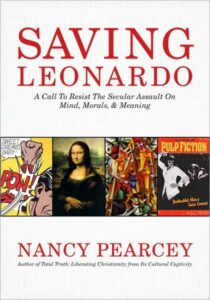 SAVING LEONARDO: A CALL TO RESIST THE SECULAR ASSAULT ON MIND, MORALS, & MEANING
SAVING LEONARDO: A CALL TO RESIST THE SECULAR ASSAULT ON MIND, MORALS, & MEANING
NANCY R. PEARCEY
From the Publisher: Is secularism a positive force in the modern world? Or does it lead to fragmentation and disintegration? In Saving Leonardo, best-selling award-winning author Nancy Pearcey (Total Truth, coauthor How Now Shall We Live?) makes a compelling case that secularism is destructive and dehumanizing.
Pearcey depicts the revolutionary thinkers and artists, the ideas and events, leading step by step to the unleashing of secular worldviews that undermine human dignity and liberty. She crafts a fresh approach that exposes the real-world impact of ideas in philosophy, science, art, literature, and film–voices that surround us in the classroom, in the movie theater, and in our living rooms.
A former agnostic, Pearcey offers a persuasive case for historic Christianity as a holistic and humane alternative. She equips readers to counter the life-denying worldviews that are radically restructuring society and pervading our daily lives. Whether you are a devoted Christian, determined secularist, or don’t know quite where you stand, reading Saving Leonardo will unsettle established views and topple ideological idols. Includes more than 100 art reproductions and illustrations that bring the book’s themes to life.
FINDING TRUTH: 5 PRINCIPLES FOR UNMASKING ATHEISM, SECULARISM, AND OTHER GOD SUBSTITUTES.
NANCY R. PEARCEY
From the Publisher: Don’t Think, Just Believe?
That’s the mantra in many circles today–whether the church, the classroom, the campus, or the voting booth.
Time for a Reality Check
Nancy Pearcey, bestselling and critically acclaimed author, offers fresh tools to break free from presumed certainties and test them against reality. In Finding Truth, she explains five powerful principles that penetrate to the core of any worldview–secular or religious–to uncover its deepest motivations and weigh its claims.
A former agnostic, Pearcey demonstrates that a robust Christian worldview matches reality–that it is not only true but attractive, granting higher dignity to the human person than any alternative.
Finding Truth displays Pearcey’s well-earned reputation for clear and cogent writing. She brings themes to life with personal stories and real-world examples. The book includes a study guide shaped by questions from readers, from teens to college professors. It is ideal for individual or group study.
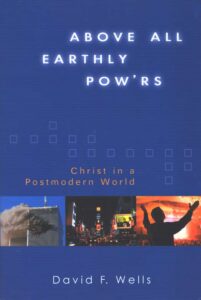 ABOVE ALL EARTHLY POWERS: CHRIST IN A POSTMODERN WORLD
ABOVE ALL EARTHLY POWERS: CHRIST IN A POSTMODERN WORLD
DAVID F. WELLS
From the Publisher: The deflation of the Enlightenment worldview and rise of the post-modern mood over the last decades has altered the relation of Christian faith to culture. How, in this new situation, should the church confess Christ? “Above All Earthly Powers” paints a picture of the West in all its complexity, brilliance, and emptiness.
As David F. Wells masterfully depicts it, the postmodern ethos is relativistic, individualistic, therapeutic, and yet remarkably spiritual. By placing a premium on marketing rather than truth, the evangelical church is in danger of selling authentic engagement with culture for worldly success. Christians need to confess Christ as the center in a society lacking a center, as the sovereign in a world seemingly ruled by chance, and as the one who can give meaning in a nihilistic culture. “Above All Earthly Powers” issues a prophetic call to the evangelical church that it cannot afford to ignore.
A PECULIAR GLORY: HOW THE CHRISTIAN SCRIPTURES REVEAL THERI COMPLETE FAITHFULNESS
JOHN PIPER
From the Publisher: God has provided a way for all people, not just scholars, to know that the Bible is the Word of God. John Piper has devoted his life to showing us that the glory of God is the object of the soul’s happiness. Now, his burden in this book is to demonstrate that this same glory is the ground of the mind’s certainty.
God’s peculiar glory shines through his Word. The Spirit of God enlightens the eyes of our hearts. And in one self-authenticating sight, our minds are sure and our hearts are satisfied. Justified certainty and solid joy meet in the peculiar glory of God.
READING SCRIPTURE WITH THE CHURCH 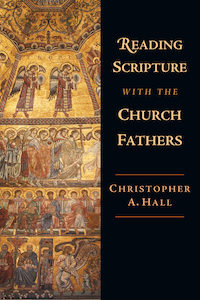
FATHERS
CHRISTOPHER A. HALL
From the Publisher: Many Christians today long to become reacquainted with their ancient ancestors in the faith. They see a deeper worship and devotion in the prayers and hymns of the early church. And they believe that the writings of the early church can shed new light on their understanding of Scripture.
But where and how do we begin? Our first encounter with the writings of the church fathers may seem like visiting a far country where the language, assumptions, concerns and conclusions are completely unfamiliar to us. In Reading Scripture with the Church Fathers Christopher Hall helps us through this cultural confusion, introducing us to the early church, its unique world, and the sights and sounds of Scripture that are highlighted for them. As Hall points out, the ancient fathers hear music in Scripture where we remain tone-deaf. Despite their occasional eccentricities, theirs is a hearing refined through long listening in song, worship, teaching, meditation and oral reading. And like true masters they challenge and correct our modern assumptions as they invite us to tune our ears to hear the divine melodies of the Bible.
Reading Scripture with the Church Fathers is an exceptional guide. Hall provides a warm, winsome, informative and indispensable introcution to who these leaders and scholars were, how they read and interpreted Scripture, and how we might read Scripture with them for all its worth.
LARRY HART
A Balanced Theology for Evangelicals and Charismatics
From the Publisher: “Larry Hart’s Truth Aflame brings together charismatic renewal and classic evangelical faith better than anything I have read. An important contribution to the contemporary renaissance in systematic theology!” Timothy George Dean of Beeson Divinity School of Samford University, Executive Editor of Christianity Today
As the Pentecostal/charismatic movement continues to grow, so does the need for solid theological resources for its members. While there are many volumes of systematic theology available, very few are written from a distinctly charismatic perspective. Truth Aflame seeks to meet that need. While academically sound, Truth Aflame is written with a practical, pastoral flavor.
Larry Hart defines systematic theology as the process of taking what the Bible teaches and relating it to contemporary questions and knowledge. His passion for the subject is evident: he is concerned that the reader both grasps the magnificence of the study of God and allows these great truths to be transformative. This Truth, then—liberating, enlivening, and transforming Truth—becomes central to the ongoing renewal of the church that we are seeing in our day. Dr. Hart treats each of the traditional categories—revelation, God, creation, humanity, sin, Christ, salvation, the church, and last things—from a Pentecostal/charismatic perspective. He addresses other theological viewpoints but does not get bogged down in analysis and rebuttal. Further, he seeks to build bridges of understanding to those evangelicals outside the charismatic tradition.
Clear, succinct, and readable, this revised and updated edition of Truth Aflame is well-suited not only for students, but for anyone desiring a greater understanding of Pentecostal/charismatic theology.
The Heresy of Orthodoxy: How Contemporary Culture’s Fascination 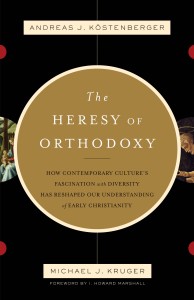 With Diversity Has Reshaped Our Understanding of Early Christianity – Andreas J. Köstenberger and Michael J. Kruger
With Diversity Has Reshaped Our Understanding of Early Christianity – Andreas J. Köstenberger and Michael J. Kruger
From the Publisher: Beginning with Walter Bauer in 1934, the denial of clear orthodoxy in early Christianity has shaped and largely defined modern New Testament criticism, recently given new life through the work of spokesmen like Bart Ehrman. Spreading from academia into mainstream media, the suggestion that diversity of doctrine in the early church led to many competing orthodoxies is indicative of today’s postmodern relativism. Authors Köstenberger and Kruger engage Ehrman and others in this polemic against a dogged adherence to popular ideals of diversity.
Köstenberger and Kruger’s accessible and careful scholarship not only counters the “Bauer Thesis” using its own terms, but also engages overlooked evidence from the New Testament. Their conclusions are drawn from analysis of the evidence of unity in the New Testament, the formation and closing of the canon, and the methodology and integrity of the recording and distribution of religious texts within the early church.
JPC 60-Second Review: Theology has been closeted, even coffined, by a large segment of the church. Rather than “contend for the faith that was once for all delivered to the saints” (Jude 1.3), it would seem that large segements of the church have become more interested in compromising that once-for-all-and-all-time faith for the sake of being accepted by our culture. Perverting Paul’s observation that he had become “all things to all people, that by all means (he) might save some (I Corinthians 9.22), parts of the church are now openly accepting all doctrines of all people that by all means the church, not the Gospel, might be accepted by some: the pluralism and diversity of our day have displaced sound doctrine in the church. In order to defend their “other Gospel, which, in fact, is not the Gospel at all (Galatians 1.6-7), this pseudo-church has necessarily sought to find substantiation of its diverse (non-orthodox) doctrines in church history, cheering the Bauer-Ehrman theory, and reading diversity, ie, various kinds of Christianity, back into the early church.
Köstenberger and Kruger take on this fabrication, exposing it for the lie that it is, not with historical research. K&K demonstrate that, no, heresy is not, in fact, orthodoxy: orthodoxy was delivered to us over and over again from the earliest days of the Old Testament, through the teachings of Jesus, the echoes of the eyewitness-Apostles and their teaching, the earliest writings of the church, the Gospels, and finally, the tenacity of the church in rooting out heresy, and in the final affirmations of the creeds.
The Heresy of Orthodoxy is a very helpful study for any theologian, pastor, or serious student of the Word of God who seeks to understand that our faith is not, nor has it ever been, many faiths of diverse and pluralistic teachings, but one faith, once and for all delivered to all saints. Readers will also appreciate the authors’ treatment of the trustworthy formation of the Biblical Canon. Highly recommended.
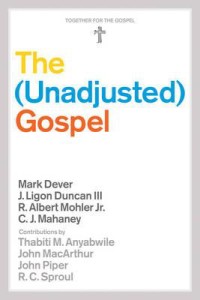 The (Unadjusted) Gospel – Mark Dever, J. Ligon Duncan III, R. Albert Mohler Jr., C.J. Mahaney, Thabiti M. Anyabwile, John MacArthur, John Piper, R.C. Sproul
The (Unadjusted) Gospel – Mark Dever, J. Ligon Duncan III, R. Albert Mohler Jr., C.J. Mahaney, Thabiti M. Anyabwile, John MacArthur, John Piper, R.C. Sproul
From the Publisher:
Responding to the perennial temptation to “tame” the message about Jesus, eight prominent church leaders, including John Piper, John MacArthur, Al Mohler, and R. C. Sproul, challenge Christians to hold fast to the faith by emphasizing the importance of maintaining a pure and unadulterated view of the gospel.
Looking back at the New Testament and the church fathers and forward to the church’s continued mission of faithful biblical preaching and effective cultural engagement, the contributors draw on their extensive ministry experience to offer us a thoughtful plea for safeguarding the message of the gospel in the midst of our pluralistic world.
The JPC 60-Second Review: The (Unadjusted) Gospel represents the plenary session messages brought by leading evangelical theologians to the 2010 Together for the Gospel Conference, a bi-annual gathering of evangelical pastors. TUG is the collective effort of the authors to present an argument, encouragement and path for living and ministering the Gospel together as members of the body of Christ, whatever our church affiliation.
Chapter themes include:
The Church is the Gospel Visible
The Defense and the Confirmation of the Gospel
Trajectories Toward an Adjusted Gospel
How Wrongly “Engaging the Culture” Adjusts the Gospel
Sowing Seed and Sleeping Well
Did Jesus Preach the Gospel of Paul?
Did the Church Fathers Know the Gospel?
Ordinary Pastors.
TUG is a defense of the Gospel in doctrine, in individual discipleship, and in church life. The Gospel is held out as defining message of the church for the church and for the world. As such, it is a message to be continually examined, protected, understood, taught, preserved, preached, applied, defended, conformed to, celebrated, enjoyed, lived in and lived out.
It is clear in our day that the Gospel is not only under attack in American culture, but in many quarters of the American church – even within the Evangelical church. Many in the church of Jesus Christ have become bored with Jesus. This is reflected in the apathy of many in the church toward His Gospel – we are told that we have to find a message that is relevant to us and our world. Many in the church of Jesus Christ have become embarrassed with Jesus Christ. This is reflected in the altering – the adjusting – of the Gospel by many in the church – we are told that Jesus didn’t die to satisfy the wrath of God (“the God we serve isn’t mad at anyone”), but to show us how much God loves us. Etc, etc, etc.
The Gospel must be restored to the primacy given it by Jesus Christ. And it must be preserved in its purity, again, as given to us by Jesus Christ, and explained by the New Testament. It is only as we come to believe the unadjusted Gospel that we will be able to stand one day before the eternal and unadjusting Judge of Heaven and Earth. Highly recommended.
NO PLACE FOR TRUTH: WHATEVER HAPPENED TO EVANGELICAL THEOLOGY – DAVID F. WELLS
From the Publisher: Has something indeed happened to evangelical theology and to evangelical churches? According to David Wells, the evidence indicates that evangelical pastors have abandoned their traditional role as ministers of the Word to become therapists and “managers of the small enterprises we call churches.” Along with their parishioners, they have abandoned genuine Christianity and biblical truth in favor of the sort of inner-directed experiential religion that now pervades Western society.
Specifically, Wells explores the wholesale disappearance of theology in the church, the academy, and modern culture. Western culture as a whole, argues Wells, has been transformed by modernity, and the church has simply gone with the flow. The new environment in which we live, with its huge cities, triumphant capitalism, invasive technology, and pervasive amusements, has vanquished and homogenized the entire world. While the modern world has produced astonishing abundance, it has also taken a toll on the human spirit, emptying it of enduring meaning and morality.
Seeking respite from the acids of modernity, people today have increasingly turned to religions and therapies centered on the self. And, whether consciously or not, evangelicals have taken the same path, refashioning their faith into a religion of the self. They have been coopted by modernity, have sold their soul for a mess of pottage. According to Wells, they have lost the truth that God stands outside all human experience, that he still summons sinners to repentance and belief regardless of their self-image, and that he calls his church to stand fast in his truth against the blandishments of a godless world.
The first of three volumes meant to encourage renewal in evangelical theology (the other two to be written by Cornelius Plantinga Jr. and Mark Noll), No Place for Truth is a contemporary jeremiad, a clarion call to all evangelicals to note well what a pass they have come to in capitulating to modernity, what a risk they are running by abandoning historic orthodoxy. It is provocative reading for scholars, ministers, seminary students, and all theologically concerned individuals.
The JPC 60-Second Review: Excerpts From the Book: Without costly caring (for truth first), there is no leadership. Without leadership, there is no articulated vision. And in the absence of public vision, it is easy to equate the norms of culture with the truths of God. Without real leaders, God’s people are led by pollsters – which is to say, they lead themselves. And if this means . . . that theology becomes either so diminished in importance or so eviscerated in nature as to lose its ability to impart the vision of God that alone can sustain His people in the cauldron of modernity, then Christian faith is also lost
The (early) church movement would have remained tiny but for one fact: the first Christians knew that their faith was absolutely true, that it could brook no rivals, and so they sought no compromises . . .
Genuine leadership in the Church is not a matter of finding out what everyone wants and already knows and articulating it; genuine leadership is a matter of teaching and explaining what has not been so well grasped, where the demands of God’s truth and the habits of the culture pull in opposite directions . . . There can be no leadership without a vision of both what the Church has become and what, under God, it should be . . .
Warning: There are no pictures or catchy quips to hold your attention in this book. Bring your “A” game to the desk when you pick up this steak-of-a-book. The pop culture theology in your local Christian book store may be sweeter, but this book will satisfy your soul.
From the Publisher: Often Christians do not know what they believe or why they believe it. And according to John Hannah, a Christianity that is divorced from its theological history is merely morality rather than the vibrant, biblical faith that changes hearts and lives. Theologians regard theology not as an intellectual pursuit, but as “the art of living unto God.” Understanding biblical truth is actually a means to living a godly life. Theology doesn’t just provide us with insights about God; it provides the foundation from which we respond appropriately to God. Why does theology matter? An accurate comprehension of theology keeps us from confusing popular opinion with truth. It helps us distinguish between what is transient and what is eternal. Understanding theology in its historical context can also keep us from error. It guards us from being deceived by things that have the appearance of wisdom, but are not of God. And knowledge of the history of doctrine reminds us of the ultimate triumph of God and His people-in spite of the protestations of the world around us to the contrary. What you believe does matter. As you explore the truths in this book, you will discover that theology is not just a collection of information about God-it is a rich legacy. It is your legacy.
JPC 60-Second Review: An outstanding and very readable theology book, this would be a great place to begin your systematic study of the essential doctrines of Scripture. The Authority of Scripture, the Trinity, the person of Jesus Christ, the work of Christ, salvation, the Church, the end times – each of these seven doctrines are presented, but in a most intriguing and effective way. Hannah presents a basic biblical understanding of each doctrine, doing so from writings of each of the five major historical eras from 100 A.D. to the present. His presentation is complete, concise and clear. The reader’s confidence in each doctrine is strengthened like steel in understanding that this doctrine is not the product of current pop culture preachers or writers, but is the revelation of God, tested and proven countless times over the centuries by the church of Jesus Christ on every continent of the planet. This is one inspiring book of theology. Highly recommended.
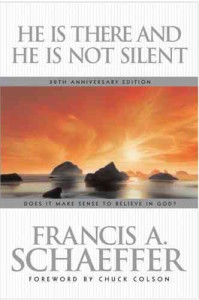 HE IS THERE AND HE IS NOT SILENT – FRANCIS SCHAEFFER:
HE IS THERE AND HE IS NOT SILENT – FRANCIS SCHAEFFER:
From the Publisher: This book deals with the philosophic necessity of God’s being there and not being silent, in the areas of metaphysics, morals, and epistemology.
The JPC 60-Second Review: Schaeffer is masterful in his ability to take seemingly difficult theological topics and explaining them in clear, concise ways. He does just that in this surprisingly brief book on the existence of God. Schaeffer demonstrates not only the existence of God, but the personal nature of God, one revealed to us plainly in ways we can easily recognize: God really IS there and, no, He is NOT silent. Mankind asks the question about God’s existence and responds from the silence of the despair in its own heart, but God continues to speak to mankind, revealing Himself to us if only we will look and listen. If you’ve not yet read Schaeffer, pick up this book along with The God Who is There, and Escape From Reason. You’ll find Schaeffer to be a wise professor who teaches from an easy chair. All-in-all, a very comfortable read.
Recent Tweets
JPC Instagram
© [2015] — Journey Pastoral Coaching


